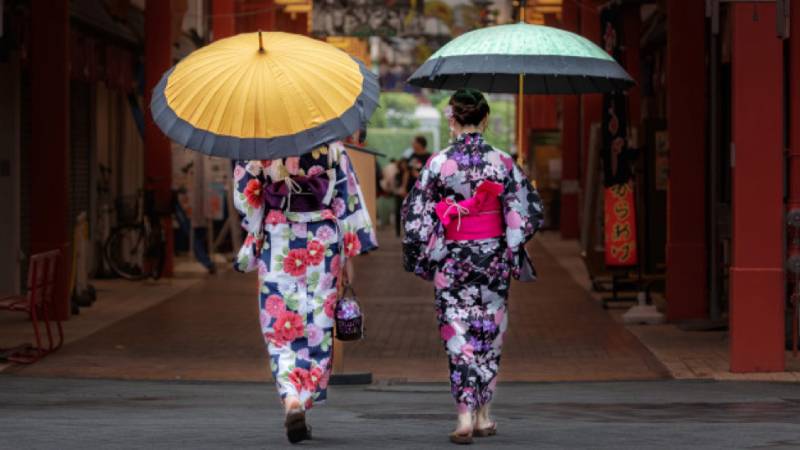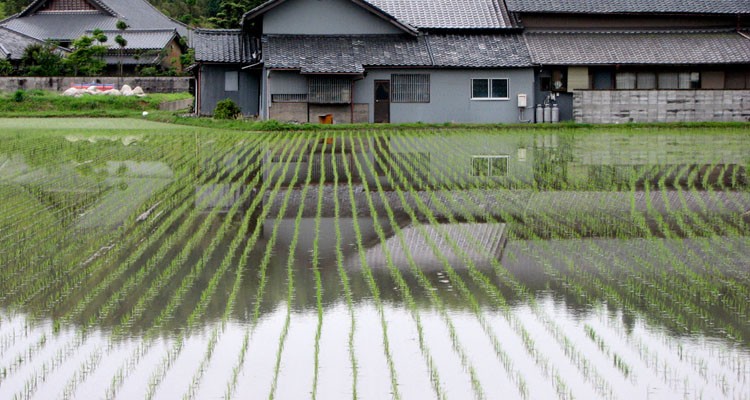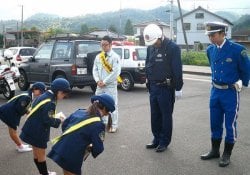Looking for a list of Japanese last names? What are the most common Japanese surnames? Do you know the meaning of the main surnames? Why do Japanese people usually have only two names? Why does the Last Name come first in Japan? These and other questions will be answered in this article.
Índice de Conteúdo
The History of Japanese Surnames
Do you know the history of Japanese surnames? Not long ago, in the Meiji Era (1868-1912) common people did not have surnames. Only people from positions such as nobility, artists, and regional clan chiefs.
Sometimes warriors, doctors, monks, and merchants got a surname by buying. Ordinary people were identified by profession or location, merchants used to use their store name as identification or a surname.

How did people differ from one another?
If in a city 2 people are called Souta, whoever lived in the mountains ended up being called Yamamoto no Souta which literally means Souta from the foot of the mountain 山本 (foot of the mountain). This is yet another reason why the last name comes before the first name.
For this reason, Japanese names and surnames end up being simple and having common meanings that identify the personality, family origin, place they lived, their social class and history.
In addition, ideograms help Japanese names to be more complex, allowing several ways to read an ideogram and write using other ideograms. Not to mention that a name can have multiple meanings thanks to the kanji.
Research reveals that there are between 100,000 to 300,000 surnames in Japan, making it one of the countries with the highest number of surnames in the world. This seems ironic, because the Japanese has few syllables compared to other languages.
Examples of Japanese surname origins
As mentioned, many Japanese surnames referred to specific locations or characteristics about a particular family, see some popular examples below:
- Derived from place name – Watanabe, Takahashi, Sasaki, Ishikawa, Hasegawa, Miura, Chiba...;
- Derived from topography and landscape - Yamamoto, Yamada, Mori, Ikeda...
- Derived from the relationship orientation or position - Minami, Kita, Tatsumi...;
- Derived from occupation – Hattori, Shoji, Tokairin, Inukai, Ukai, Kobun...;

Myouji - Family name in Japanese
Surnames or family names in Japanese are called myouji [名字 or 苗字] sometimes called I know [姓]. In the past, the Japanese surname was called naazana [名字], here are some related words that can help increase your Japanese vocabulary:
| Japanese | Romaji | Meaning |
| 同姓 | doubled | same last name |
| 元姓 | gensei | About previous name, original |
| 他姓 | ok I know | another surname |
| 異姓 | I know | different last name |
| 宮号 | miyagou | Imperial surname |
| 漢姓 | kansei | Chinese surname |
| 名前 | namae - name | First name |
| ラストネーム | rasutoneemu | Surname |
| 家名 | Kamei | family name, house |
The most common surnames in Japan
The most common surname in Japan is Satou, more than 1,928,000 people have this surname. Satou is written mainly with the ideograms [佐藤] which together mean field of wisteria. Below you can see a list of the 10 most common surnames in all of Japan, the number of people who have that surname and what it means.
| Last name | Population | Ideogram | Meaning | |
| 1 | Satou | 1.928.000 | 佐藤 | wisteria field |
| 2 | Suzuki | 1.707.000 | 鈴木 | bell tree |
| 3 | Takahashi | 1.416.000 | 高橋 | long bridge |
| 4 | Tanaka | 1.336.000 | 田中 | In the middle of the rice field |
| 5 | Watanabe | 1.134.000 | 渡辺 / 渡邊 | Go over |
| 6 | Itou | 1.080.000 | 伊藤 | Ise's Wisteria |
| 7 | Yamamoto | 1.077.000 | 山本 | mountain person |
| 8 | Nakamura | 1.059.000 | 中村 | inside the village |
| 9 | Kobayashi | 1.019.000 | 小林 | small forest |
| 10 | Saitou | 980.000 | 斉藤 / 斎藤 | Affectionate Wisteria. |
The first character of the name Saitou (斉) can be used to refer to a meal made by monks and priests. It also conveys an image of purity and divided worship.
It is worth remembering the japanese names usually represent their meaning in reverse. The ideograms can be written in the order High(高) Bridge(橋) but they mean High (or Long) Bridge. And we can't always take the literal meaning of the ideogram.

The article is still halfway through, but we recommend also reading:
Are surnames nicknames?
As we can see throughout this article, surnames are practically nicknames, since the definition is to expose a person's characteristic in an affectionate or pejorative way. Japanese surnames are basically a characteristic of the person and the place where they live.
Since Japanese names are practically nicknames, how do Japanese people affectionately call themselves? This happens by making changes to the name or adding suffixes.
If you want to know more about Japanese Nicknames, we suggest reading our full article by clicking below: >> All About Japanese Nicknames!
List of 200 common Japanese surnames
Below, we will leave a short list with the 200 most common names in the Japanese language. This list was shared by Studiare Giapponese and is in alphabetical order.
| Kanji | Romaji | Meaning |
| 阿部 | Abe | nice group |
| 秋山 | Akiyama | autumn mountain |
| 安藤 | walked | Quiet Wisteria |
| 青木 | Aoki | Green Tree |
| 青山 | Aoyama | blue/green mountain |
| 新井荒井 | Arai | Poço NovoNew Residence |
| 荒木 | Araki | wild tree |
| 浅野淺野 | Asano | shallow plain |
| 馬場 | Grandmother | riding land |
| 千葉 | Chiba | A thousand sheets |
| 遠藤 | Endou | far from wisteria |
| 藤井 | Fujii | Wisteria Well |
| 藤本 | Fujimoto | Origin of Wisteria |
| 藤田 | Fujita | Wisteria plantation |
| 藤原 | Fujiwara | wisteria field |
| 福田 | Fukuda | rice paddy |
| 福井 | Fukui | good luck well |
| 福島 | Fukushima | Good Luck Island |
| 古川 | Furukawa | old river |
| 後藤 | gotu | behind the wisteria |
| 萩原 | Hagiwara | clover plain |
| 浜田 | Hamada | beach rice paddy |
| 原 | Hara | Field |
| 原田 | Harada | Planting in the Field |
| 長谷川 | Hasegawa | Long river that runs through the valley |
| 橋本 | Hashimoto | Base/Origin of the Bridge |
| 服部 | Hattori | clothing alliance |
| 早川 | Hayakawa | rapid river |
| 林 | Hayashi | woods |
| 樋口 | Higuchi | water spout |
| 平井 | Hirai | Well Placido |
| 平野 | hyrano | Flat Field |
| 平田 | Hirata | pacific rice paddy |
| 広瀬廣瀬 | Hirose | wide and shallow |
| 本田 | Honda | original rice field |
| 本間 | Honma | Name of a clan that ruled the province of Sado |
| 堀 | time | moat |
| 星野 | Hoshino | Star Field |
| 市川 | Ichikawa | city river |
| 五十嵐 | Igarashi | fifty storms |
| 飯田 | go | Cooked Rice Husk |
| 池田 | Ikeda | plantation with lake |
| 今井 | Imai | Current Well |
| 井上 | Inoue | on top of the well |
| 石橋 | Ishibashi | stone bridge |
| 石田 | Ishida | stony plantation |
| 石原 | Ishihara | rocky plain |
| 石井 | Ishii | stone well |
| 石川 | Ishikawa | stony river |
| 伊藤 | Itou | Ise Wisteria (Mie City) |
| 岩本 | Iwamoto | Base of the Rock |
| 岩崎 | Iwasaki | End of the Rock |
| 岩田 | Iwata | Rocky Rice Plantation |
| 鎌田 | Kamata | Rice Field Sickle |
| 金子 | Kaneko | lucky son |
| 片山 | Katayama | single mountain |
| 加藤 | Katou | Kaga Wisteria (Former name of Ishikawa) |
| 川口 | Kawaguchi | River entrance |
| 川上 | Kawakami | above the river |
| 川村 | Kawamura | river village |
| 川波 | Kawanami | river wave |
| 川崎 | Kawasaki | end of the river |
| 菊地菊池 | Kikuchi | Chrysanthemum LandChrysanthemum Pond |
| 木村 | Kimura | Village with Trees |
| 木下 | kinoshite | under the tree |
| 北村 | Kitamura | North Village |
| 小林 | Kobayashi | small forest |
| 小池 | Koike | little lake |
| 小島 | Kojima | Little island |
| 小松 | Komatsu | little pine tree |
| 近藤 | Kondou | Close to Wisteria |
| 小西 | Konishi | Little West |
| 河野 | Kouno (Kawano) | river with plain |
| 小山 | Koyama | little mountain |
| 久保 | Kubo | uneven terrain |
| 久保田 | Kubota | Rice plantation with unevenness |
| 工藤 | Kudou | Skillful Wisteria |
| 熊谷 | Kumagai | Bear Valley |
| 栗原 | Kurihara | Castanheiras Plain |
| 黒田 | Kuroda | Black Rice Plantation |
| 前田 | Maeda | In front of the rice field |
| 丸山 | Maruyama | round mountain |
| 増田 | Masuda | Expanded plantation |
| 松原 | Matsubara | Plain of the Pines |
| 松田 | Matsuda | rice field with pine |
| 松井 | Matsui | Pinheiro Well |
| 松本 | Matsumoto | Pine tree base |
| 松村 | Matsumura | village of pine trees |
| 松尾 | Matsuo | pine tail |
| 松岡 | Matsuoka | pine hill |
| 松下 | Matsushita | under the pine |
| 松浦 | Matsuura | Pinheiros Bay |
| 南 | Minami | On |
| 三浦 | Miura | three bays |
| 三宅 | Miyake | three houses |
| 宮本 | Miyamoto | Origin of the Temple/Palace |
| 宮田 | Miyata | Shrine rice plantation |
| 宮崎 | Miyazaki | End of the Temple/Palace |
| 水野 | Mizuno | Water Field |
| 望月 | Mochizuki | Full moon |
| 森 | Mori | woods |
| 森本 | Morimoto | Forest Base |
| 森田 | Morita | plantation in the forest |
| 村上 | Murakami | on top of the village |
| 村田 | Murata | village plantation |
| 長井永井 | Nagai | Very LongWell Forever |
| 長田永田 | Nagata | long rice field |
| 内藤 | Naitou | indoor wisteria |
| 中川 | Nakagawa | Central River |
| 中島 | NakajimaNakashima | central island |
| 中村 | Nakamura | middle of the village |
| 中西 | Nakanishi | midwest |
| 中野 | Nakano | Central Field |
| 中田 | NakataNakada | Central rice field |
| 中山 | Nakayama | Inside the Mountain |
| 成田 | nose | Rice field formation |
| 西田 | Nishida | western rice plantation |
| 西川 | Nishikawa | west river |
| 西村 | Nishimura | west village |
| 西山 | Nishiyama | west mountain |
| 西沢 | Nishizawa | swamp of the west |
| 野田 | Noda | Rice plantation in the field |
| 野口 | Noguchi | Field Entrance |
| 野村 | Nomura | Countryside Village |
| 小田 | Oda | Small Rice Plantation |
| 小川 | Ogawa | small river |
| 岡田 | Okada | hill rice field |
| 岡本 | Okamoto | hill base |
| 岡崎 | Okazaki | cape hill |
| 奥村 | Okumura | isolated village |
| 小野 | Ono | Small Field |
| 大橋 | Oohashi | great bridge |
| 大石 | Ooishi | big stone |
| 大久保 | "Ookubo" | big hollow |
| 大森 | Oomori | Big help |
| 大西 | Oonishi | great west |
| 大野 | Oono | great plain |
| 大沢大澤 | Oosawa | great swamp |
| 大島 | Ooshima | big island |
| 太田 | Ooo | Fertile rice field |
| 大谷 | Ootani | great valley |
| 大塚 | Ootsuka | Great Ancient Tomb |
| 尾崎 | Ozaki | end of the cable |
| 小沢小澤 | Ozawa | little swamp |
| 斎藤齋藤 | Saitou | Affectionate Wisteria |
| 斎藤 / 齋藤 | Saitou | Affectionate Wisteria |
| 酒井 | Sakai | sake pit |
| 坂本 | Sakamoto | Bottom of the descent |
| 桜井櫻井 | Sakurai | Cherry Well |
| 佐野 | healthy | Small Field |
| 佐々木 | Sasaki | Support Tree |
| 佐藤 | Satou | Field of Wisterias |
| 沢田 | "Sawada" | Rice Plantation in the Swamp |
| 関/關 | Seki | barrier/gate |
| 柴田 | Shibata | Planting with Sticks |
| 島田 | Shimada | Island plantation |
| 清水 | Shimizu | Pure water |
| 篠原 | Shinohara | Bamboo grass plain |
| 菅原 | Sugawara | field of sedge |
| 杉本 | Sugimoto | Origin of Cedar |
| 杉山 | Sugiyama | cedar mountain |
| 須藤 | Sutou Sudou | Mandatory Wisteria |
| 鈴木 | Suzuki | bell tree |
| 田口 | Taguchi | Entrance to the Rice Field |
| 高田 | Takada Takata | tall plantation |
| 高木 | Takagi | Tall Tree |
| 高橋 | Takahashi | high bridge |
| 高野 | Takano | Campo Alto |
| 高山 | Takayama | High mountain |
| 武田 | Takeda | Warrior's rice field |
| 竹内 | Takeuchi | Inside the Bamboo |
| 田村 | Tamura | village with rice paddies |
| 田辺田邊 | Tanabe | Next to the rice plantation |
| 田中 | Tanaka | middle of rice field |
| 谷口 | Taniguchi | opening of the valley |
| 土屋 | Tsuchiya | Clay house |
| 辻 | Tsuji | Crossroads (Cross Road) |
| 内田 | Uchida | Inside the Plantation |
| 内山 | Uchiyama | Mountain interior |
| 上田 | UedaUeta | Top/top planting |
| 上野 | Ueno | on top of the plain |
| 和田 | Wada | Harmonious plantation |
| 渡辺 | Watanabe | cross the edge |
| 山田 | Yamada | Mountain rice field |
| 山口 | Yamaguchi | Opening to the Mountain |
| 山本 | Yamamoto | base of the mountain |
| 山中 | Yamanaka | Mountain Center |
| 山下 | Yamashita | Under the Mountain |
| 山内 | Yamauchi | Inside the Mountain |
| 山崎 | YamazakiYamasaki | Mountain's Edge |
| 矢野 | Yano | eighth field |
| 安田 | Yasuda | cheap rice paddy |
| 横田 | Yokota | rice field next door |
| 横山 | Yokoyama | beside the mountain |
| 吉田 | Yoshida | Auspicious plantation |
| 吉川 | Yoshikawa | auspicious river |
| 吉村 | Yoshimura | auspicious village |
| 吉岡 | Yoshioka | auspicious hill |
How can I find out the meaning of my name?
We recommend picking up an online dictionary like jisho and research the various meanings of each ideogram and try to create a relationship between the 2. It is worth remembering that Japanese names can have different pronunciations and ideograms, so don't get attached to a list without knowing how to spell your name.
If you want to delve into Japanese names, we recommend a JBC's Dictionary of Japanese Names (click for details). Let's leave a video explaining how you can find out on your own the meaning of Japanese names:






